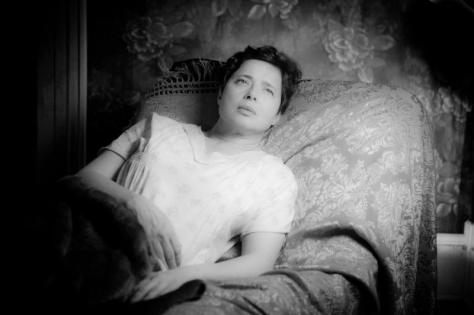
Format: Cinema
Dates: 14 September 2012
Venues: Key cities
Distributor: Soda Pictures
Director: Guy Maddin
Writer: George Toles, Guy Maddin
Cast: Jason Patric, Isabella Rossellini, Udo Kier, Kevin McDonald
Canada 2011
94 mins
Full disclosure: I produced Guy Maddin’s first three feature films, lived with him as a roommate (I was Oscar Madison to his Felix Unger - Neil Simon’s The Odd Couple sprang miraculously to life on the top two floors of a ramshackle old house on Winnipeg’s McMillan Avenue), continue to love him as one of my dearest friends and consider his brilliant screenwriting partner George Toles to be nothing less than my surrogate big brother.
Most importantly, I am one of Maddin’s biggest fans and refuse to believe I am not able to objectively review his work. Objectively, then, allow me to declare that I loved Keyhole.
What’s not to love?
Blending Warner Brothers gangster styling of the 30s, film noir of the 40s and 50s, Greek tragedy, Sirk-like melodrama and odd dapplings of Samuel Beckett’s Endgame and Jean-Paul Sartre’s No Exit, it is, like all Maddin’s work, best designed to experience as a dream on film. Like Terence Davies, Maddin is one of the few living filmmakers who understands the poetic properties of cinema, and this, frankly, is to be cherished as much as any perfectly wrought narrative.
This is not to say narrative does NOT exist in Maddin’s work. If you really must, dig deep and you will find it. That, however, wouldn’t be very much fun. One has a better time with Maddin’s pictures just letting them HAPPEN to you.
The elements concocted in Keyhole to allow for full experiential mind-fucking involve the insanely named gangster Ulysses Pick (Jason Patric as you’ve never seen him before - playing straight, yet feeling like he belongs to another cinematic era), who drags his kids (one dead, but miraculously sprung to life, the other seemingly alive, but not remembered by his dad) into a haunted house surrounded by guns-a-blazing.
Populated with a variety of tough guys and babe-o-licious molls, Ulysses is faced with ghosts of both the living and the dead, including his wife Hyacinth (Isabella Rossellini - gorgeous as always and imbued with all the necessary qualities to render melodrama with joy and humanity), her frequently nude father (the brilliant Louis Negin - perhaps one of the world’s greatest living character actors, who frankly should be cast in every movie ever made), chained to his bed, uttering the richly ripe George Toles dialogue, and Udo Kier (the greatest fucking actor in the world), whose appearance in this movie is so inspired I’ll let you discover for yourself the greatness of both the role and Udo himself.
Keyhole is, without a doubt, one of the most perversely funny movies I’ve seen in ages and includes Maddin’s trademark visual tapestry of the most alternately gorgeous and insanely inspired kind. For movie geeks, literary freaks and Greek tragedy-o-philes, the movie is blessed with added treats to gobble down voraciously.
Like all of Maddin’s work, it’s not all fun and games. Beneath the surface of its mad inspiration lurks a melancholy and thematic richness. For me, what’s so important and moving about the film is its literal and thematic exploration of a space. Strongly evoking that sense of how our lives are inextricably linked to so many places (or a place) and how they in turn are populated with things - inanimate objects that become more animate once we project our memories upon them - or how said places inspire reminiscence of said objects which, in turn, inspire further memories, Keyhole is as profound and sad as it’s a crazed laugh riot.
Of all the reviews about the movie that I bothered to read, I was shocked that NOBODY - NOT ONE FUCKING CRITIC - picked up on the overwhelming theme of PLACE and the SPIRIT of all those THINGS that live and breathe in our minds. It was the first thing to weigh heavily upon me when I first saw the movie. It has seldom been approached in the movies - and, for my money - NO MORE POIGNANTLY AND BRILLIANTLY than rendered by Maddin, Toles and their visionary young producer Jody Shapiro.
All the ghosts of the living and the dead (to paraphrase Joyce), the animate and inanimate, the real and the imagined, these are the things that haunt us to our graves, and perhaps beyond. And they all populate the strange, magical and haunting world of Keyhole - a world most of us, whether we want to acknowledge it or not, live in.
We are all ghosts and are, in turn, haunted by them.
Greg Klymkiw


